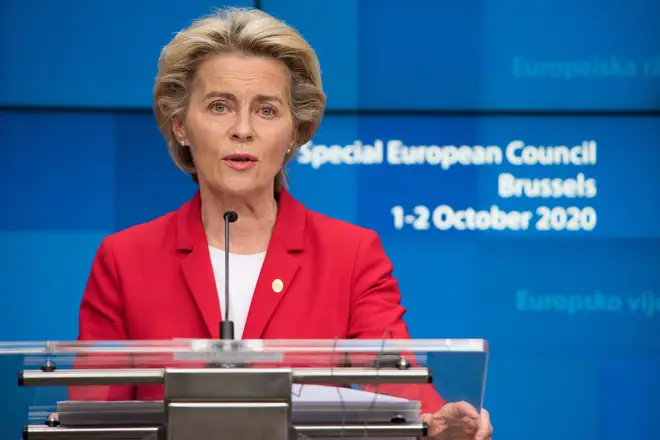
Dean Dunham 9pm - 10pm
2 October 2020, 16:26

European Commission president Ursula von der Leyen has called for trade talks with the UK to "intensify" as she prepared to speak to Boris Johnson to discuss their progress.
The two leaders will speak on Saturday to discuss the "next steps" following the conclusion of the final scheduled round of formal negotiations on a post-Brexit trade deal in Brussels.
EU chief negotiator Michel Barnier said on Friday that there continued to be issues to resolve on fishing, state aid and governance, all three of which have been long-term bugbears in the talks.
Read more: Boris Johnson steps into Brexit negotiations after EU launches legal action against UK
The announcement of the video conference call between the Prime Minister and Ms von der Leyen prompted speculation that they could be preparing to launch a final series of intensive talks - dubbed "the tunnel" - in a last push for an agreement.
Speaking at a news conference in the Belgian capital, Mrs von der Leyen said she believed a deal was still possible, but warned that time was running out.
LIVE: Press conference after the second day of #EUCO https://t.co/ASbT5ag2bD
— Ursula von der Leyen (@vonderleyen) October 2, 2020
She said the "most difficult issues" - including fisheries and state aid rules - still had to be resolved if they were to get an agreement in place by the end of the Brexit transition period at the end of the year.
"It is good to have a deal - but not at any price," she said.
"We have made progress on many, many different fields but of course the most difficult ones are still completely open.
"But overall, where there is a will, there is a way, so I think we should intensify the negotiations because it is worth working hard on it.
"We are running out of time - around 100 days to the end of the year - so it is worth stepping up now."
Downing Street made clear that Mr Johnson still believed there needed to be a deal by the time of the next EU summit in two weeks' time on October 15.
The Prime Minister has indicated that he will walk away from the negotiating table if there is not an agreement by then as it will be too late to implement before the transition ends.
"We have always said the middle of October is where we believe we would need to see a resolution to this in order to make sure we have all the things we need to have in place for the end of the transition period," a No 10 spokesman said.

James O'Brien's reaction to Brexit proceedings
"We continue to work towards a free trade agreement. That's what we want, that is what we will continue to work towards."
Mrs von der Leyen and the Irish Taoiseach Micheal Martin updated EU leaders in Brussels on the state of the talks as the lead negotiators - Michel Barnier and Lord Frost - were meeting in the Belgian capital.
Speaking after the talks, Lord David Frost, UK Chief Negotiator, said: “We have just completed the ninth Round of our negotiations with the EU about our future relationship.
“These were constructive discussions conducted in a good spirit.
“In many areas of our talks, although differences remain, the outlines of an agreement are visible. This is true of most of the core areas of a trade and economic agreement – notably trade in goods and services, transport, energy, social security, and participation in EU programmes. This has however been true for some time.
“I am also encouraged that progress has been possible on a law enforcement agreement and that there has been convergence on the structure of the overall partnership.

Ed Davey on UK's Brexit strategy
“In other areas familiar differences remain. On the level playing field, including subsidy policy, we continue to seek an agreement that ensures our ability to set our own laws in the UK without constraints that go beyond those appropriate to a free trade agreement.
"There has been some limited progress here but the EU need to move further before an understanding can be reached. On fisheries the gap between us is unfortunately very large and, without further realism and flexibility from the EU, risks being impossible to bridge. These issues are fundamental to our future status as an independent country.
“I am concerned that there is very little time now to resolve these issues ahead of the European Council on 15 October.
“For our part, we continue to be fully committed to working hard to find solutions, if they are there to be found.”
The EU has been angered by Mr Johnson's UK Internal Market Bill which gives ministers the power to override provisions in the Brexit divorce settlement relating to Northern Ireland - a measure the UK says is necessary to protect the peace process.
In his statement following this week's talks, Mr Barnier said an "efficient governance framework" was "even more important" following the UK Government's decision to pass the Bill, which he said "breaches its obligations under the Withdrawal Agreement and the Protocol on Ireland/Northern Ireland".
He called for any new partnership to be "underpinned by clear rules" as he pushed for a resolve on state aid and said a "stable, sustainable and long-term agreement on fisheries" was needed.
It follows reports this week that the UK has offered Brussels a three-year transition period to allow European fishermen to reduce their British sea quota gradually, rather than face an immediate cut when the transition period ends on January 1.
On Thursday, Mrs von der Leyen announced that the commission was taking legal action against the UK for breaching its international treaty obligations in the Withdrawal Agreement.
At her press conference, however, she suggested the issue could be resolved through negotiations.